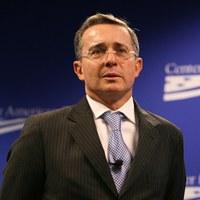Antioquia (Colombia), 1952
By Víctor Manuel Moncayo Cruz
Son of a landowning family, Álvaro Uribe Vélez completed his basic and university education in Medellín. He held various municipal and national public positions, including mayor of Medellín, governor of Antioquia (1995-1997), and director of the Administrative Department of Civil Aeronautics. He was elected senator of the Republic and served two consecutive terms (1986-1994).
His political career is clouded by alleged ties to families and figures in drug trafficking, as well as his complicity with paramilitarism. His father was assassinated in June 1983 while defending himself against an attempted kidnapping by the Revolutionary Armed Forces of Colombia (FARC). Some commentators associate this event with issues related to drug trafficking and paramilitary groups, circumstances he has always vigorously denied and which, in effect, have not been proven.
Regarding social policies, his orientations were based on Law No. 50 of 1990, concerning labor reform, and Law No. 100 of 1993, statutes mentioned as the first effective neoliberal measures in many of the programs he advanced during his government in Antioquia.
Álvaro Uribe’s figure combines very special characteristics that allowed him to establish an authoritarian regime with strong personalistic and charismatic connotations while maintaining the formal structure of a civil government. Due to his origins, closely tied to the traditional political establishment, he fought against guerrilla groups as governor of Antioquia using the model of citizen self-defense cooperatives (known as “Conviver”), which were precursors to paramilitary forces with which he is in advanced negotiation.
He is distinguished by being individualistic, hardworking, tenacious, festive, and Catholic. It is said that he is one of the 3,300 Colombians who own more than 2,000 hectares and prides himself on being a good horseman because, as he says, “the horse requires that, before thinking of disciplining it, the individual must discipline themselves to achieve balance. Because the horse does not accept indecision or mistreatment; it demands balance. The same is required by the government.”
Álvaro Uribe is a typical representative of the social group of large landowners, with all the baggage of traditionalism that this represents, but renewed by his ties to cattle ranching, his knowledge of multinational corporations dedicated to exploiting natural resources and certain export crops, and his closeness to controlling peasant economies and precarious labor relations.
These subjective conditions for authoritarianism are explicitly amplified. The president’s supreme maxim is “work, work, and work.” He tends to dress as a rural man, with a sombrero and poncho, and showcases his skills as an experienced horse handler. He boasts of his Christian virtues, his authority and rigor, and his courage in the face of threats. He gives orders with the softness of a familiar treatment and prevents any substantial controversy under the pretext of avoiding speeches, focusing on the immediate and practical. Using colloquial and parochial language, he introduced a new way of revering national symbols, placing his hand on his heart, which he emphasizes greatly, and increasingly employs to indicate that, unlike others, he has a special direct contact with the people. Public opinion thus embraces and elevates him: he is seen as the authority that was needed, with a firm hand and irrevocable decisions.
He triumphed in the presidential election in the first round, receiving a vote well above 50% and a wide margin over the official candidate of the Liberal Party (2,347,876 votes). It should also be noted that a significant component of this personalist bias is that his presidential campaign did not occur within the framework of traditional party structures, but as a new and independent movement, with methods and practices very different from the proselytizing forms that characterized electoral processes in Colombia.
His government was primarily organized based on the policy of democratic security, which involved an exclusively military approach to guerrilla groups and a selective negotiation with paramilitary organizations, distant from international standards of truth, justice, and reparation. At the same time, he continued and deepened neoliberal orientations and the reorganization of the State in accordance with the current phase of capitalism. He enjoyed a very high popularity rating (approximately 70%). He attempted and succeeded in changing the constitutional prohibition of presidential re-election in order to remain in office for another four years, and in June 2006, he was elected in the first round with over 60% of the votes.



